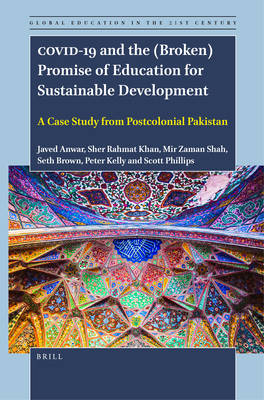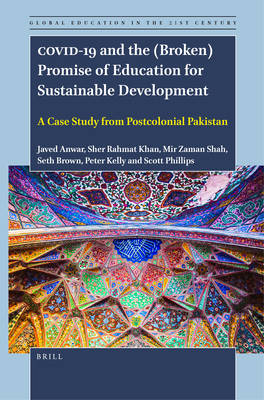
- Afhalen na 1 uur in een winkel met voorraad
- Gratis thuislevering in België vanaf € 30
- Ruim aanbod met 7 miljoen producten
- Afhalen na 1 uur in een winkel met voorraad
- Gratis thuislevering in België vanaf € 30
- Ruim aanbod met 7 miljoen producten
Zoeken
Covid-19 and the (Broken) Promise of Education for Sustainable Development
A Case Study from Postcolonial Pakistan
Javed Anwar, Sher Rahmat Khan, Mir Zaman Shah, Seth Brown, Peter Kelly, Scott Phillips
€ 87,45
+ 174 punten
Uitvoering
Omschrijving
The book charts the emergence of the COVID-19 pandemic, and the impact that it has had on the lives of young people and their communities, education systems, the teaching profession, and the responses by governments, NGOs, and donor organisations in Pakistan. Drawing on theories of postcolonialism, feminism, and neoliberal globalisation, the authors explore the development of Pakistan as a postcolonial nation-state, and examine the legacies of colonialism in education systems and policies, teacher education and development. The Pakistani authors bring extensive knowledge and experience to this case study of the 'broken promise' of education for sustainable development. This mix of theoretical insight and practical experience promises to produce significant policy and development impact in post-COVID-19 Pakistan, South Asia more broadly, and in other postcolonial development contexts around the world as it develops a critique of the UN SDGs as a global and more local framework for development.
UPCOMING: Webinar / Launch 10th of May: COVID-19 and the (broken) promise of education for sustainable development: A case study from postcolonial Pakistan.
UPCOMING: Webinar / Launch 10th of May: COVID-19 and the (broken) promise of education for sustainable development: A case study from postcolonial Pakistan.
Specificaties
Betrokkenen
- Auteur(s):
- Uitgeverij:
Inhoud
- Aantal bladzijden:
- 226
- Taal:
- Engels
- Reeks:
- Reeksnummer:
- nr. 7
Eigenschappen
- Productcode (EAN):
- 9789004540705
- Verschijningsdatum:
- 9/02/2023
- Uitvoering:
- Paperback
- Formaat:
- Trade paperback (VS)
- Afmetingen:
- 155 mm x 235 mm
- Gewicht:
- 389 g

Alleen bij Standaard Boekhandel
+ 174 punten op je klantenkaart van Standaard Boekhandel
Beoordelingen
We publiceren alleen reviews die voldoen aan de voorwaarden voor reviews. Bekijk onze voorwaarden voor reviews.







